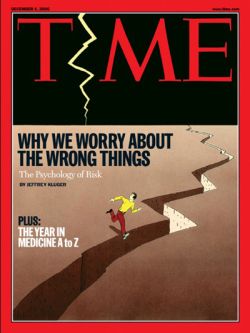 I’ve been meaning to write about a recent story in Time on risk perception — in particular, on how badly we suck at it.
I’ve been meaning to write about a recent story in Time on risk perception — in particular, on how badly we suck at it.
The basic theme is familiar by now:
We pride ourselves on being the only species that understands the concept of risk, yet we have a confounding habit of worrying about mere possibilities while ignoring probabilities, building barricades against perceived dangers while leaving ourselves exposed to real ones.
And the culprit is also well-identified: a nervous system that evolved in radically different circumstances. Thanks to a jumpy little clump of tissue called the amygdala, nestled right above the brain stem, humans are finely tuned to short-term dangers. Snakes in the grass, glowering faces — these things stimulate the amygdala and prompt a fight-or-flight squirt of hormones. That’s how we survived on the savanna.
But when it comes to non-immediate dangers — which bypass the limbic system and engage the frontal cortex — we’re subject to all sorts of distorting cognitive habits and biases. We fear loss more than we value gain. We judge ourselves less subject to risks than others. We fear possible pain more than likely death. We fear the unfamiliar more than the familiar. We’re more averse to small costs now than large costs later. Etc. Etc. Basically, we suck at long-term risk assessment.
That’s inconvenient, as modern civilization has confronted us with a panoply of risks that are abstract, incremental, and virtually invisible — thus subject to our worst cognitive peccadilloes.
What’s disappointing about the article, and about so many articles on this subject, is that it fails to apply its insights to the controversial political subjects of the day, where they might be put to good use.
No subject is more vexed by this human cognitive defect than global warming. By any rational measure, it’s an enormous threat, not just to this or that group, this or that country, but to the stability of global civilization. Civilization developed and grew in a certain range of climatic conditions. The temperature, weather patterns, precipitation cycles, the turning of the seasons … these were often lethally unpredictable on the micro scale, but they were largely predictable on the macro scale — predictable enough to allow for long-term human settlement, agriculture, trade routes, etc.
Now we’re on the verge of pushing the climate outside those parameters, causing shifting arable zones, rising oceans, species die-outs and migrations, intense droughts, storms, floods, and fires, and other results we’re only dimly beginning to understand.
But efforts to raise the alarm about this insane ad hoc experiment are met with charges of "alarmism" — while those who sent this country to war in Iraq on evidence immeasurably shakier are only now being called to account, and the pundits and commentators who supported them are still treated with respect.
Efforts to do something about global warming are met with predictions of financial calamity — while the bill for the Iraq war now approaches a boggling $2 trillion.
Why have we approached the Iraq War and global warming with such different attitudes? Because Iraq is full of scary brown faces. Because physical violence, and the threat of violence, is something that stirs our viscera, engages our sense of territoriality and tribalism. Global warming is distant. It inches forward by degrees. All of us are culprits; none of us bear any particular brunt. There’s no snake in the grass, no glowering face. In terms of human risk perception and psychology, global warming is the perfect problem.
Anyway, if you’ll pardon the relentless self-promotion, I wrote a series of posts on fear and environmentalism a while back that discusses these issues at greater length. Give them a read if this kind of stuff tickles your intellectual fancy.
 I've been meaning to write about a
I've been meaning to write about a 
